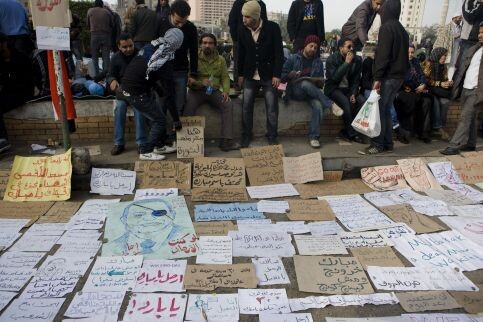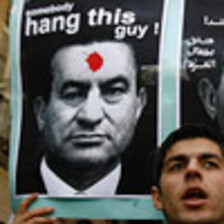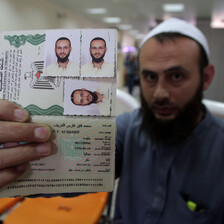The Electronic Intifada 3 February 2011

Messages of protest in Cairo, 1 February 2011. (Hossam el-Hamalawy)
CAIRO (IRIN) - Large-scale protests across Egypt since 25 January have led to deaths and injuries, food and petrol shortages and transport chaos. IRIN interviewed some of the demonstrators demanding regime change in Cairo about their daily lives. Some extracts:
Nermeen Khafagy, 41, archaeologist, holding a placard marked “Mubarak must leave.” She says she has been a political activist since her university days:
I took part in the demonstration because there is corruption, unemployment and poverty. Mubarak’s rule opened the way for the poverty of the majority, and the corruption of everybody. Our educational system is becoming very bad. The water we drink is contaminated. Farmers’ lives have been destroyed by the bad policies of the government. There are economic monopolies.
We want civil government to replace Mubarak’s military rule. We want constitutional change leading to honest presidential and parliamentary elections. We want educational reform. We want health reform. When there is reform, our country will be a great place.
This is a revolution, and revolutions are always about gains and losses. Yes, there might be price hikes. There might be suffering in getting basic needs, but the crisis has brought Egyptians closer together …
Mohamed Anwar, 62, carpenter:
I have four children. I am not able to feed them. Two of them got married, but the other two cannot get married because they do not have jobs. I am participating in this demonstration for the sake of my two children. Prices are very high, while salaries are very low. The government gives us nothing … I work with very rich people, but they do not give me my rights.
The government has been oppressing the people. We want stability. True, there are price hikes. I work very hard, but I cannot lead a dignified life.
Fatima Ali, 25, pharmacology student:
This is my country, I want it to change. I do not want corruption, I do not want bribery. My father worked in the petroleum sector for 24 years. After he retired the government gave him a pension of only 200 Egyptian pounds (US$34) a month. The government has allowed business leaders to suck the blood of poor people. Corruption goes unpunished in our country. A businessman who imported contaminated blood was not punished. Other businessmen who committed crimes were not punished. The ruling party gives immunity to its members so that they can commit crimes and go unpunished. Policemen are corrupt.
A transitional government must take over and elections should give the chance to the people to choose their president.
The demonstrations did not create the price hikes. The void created by the departure of policemen has been filled by ordinary Egyptians themselves.
This item comes to you via IRIN, a UN humanitarian news and information service, but may not necessarily reflect the views of the United Nations or its agencies. All IRIN material may be reposted or reprinted free-of-charge; refer to the copyright page for conditions of use. IRIN is a project of the UN Office for the Coordination of Humanitarian Affairs.


